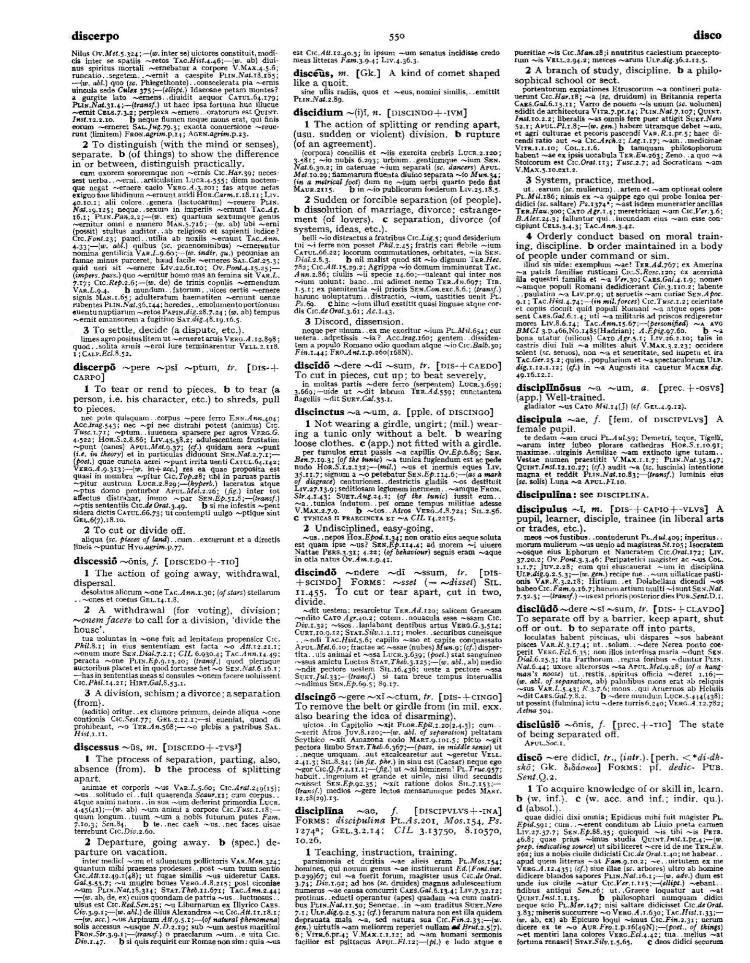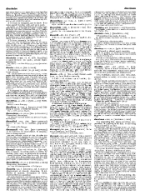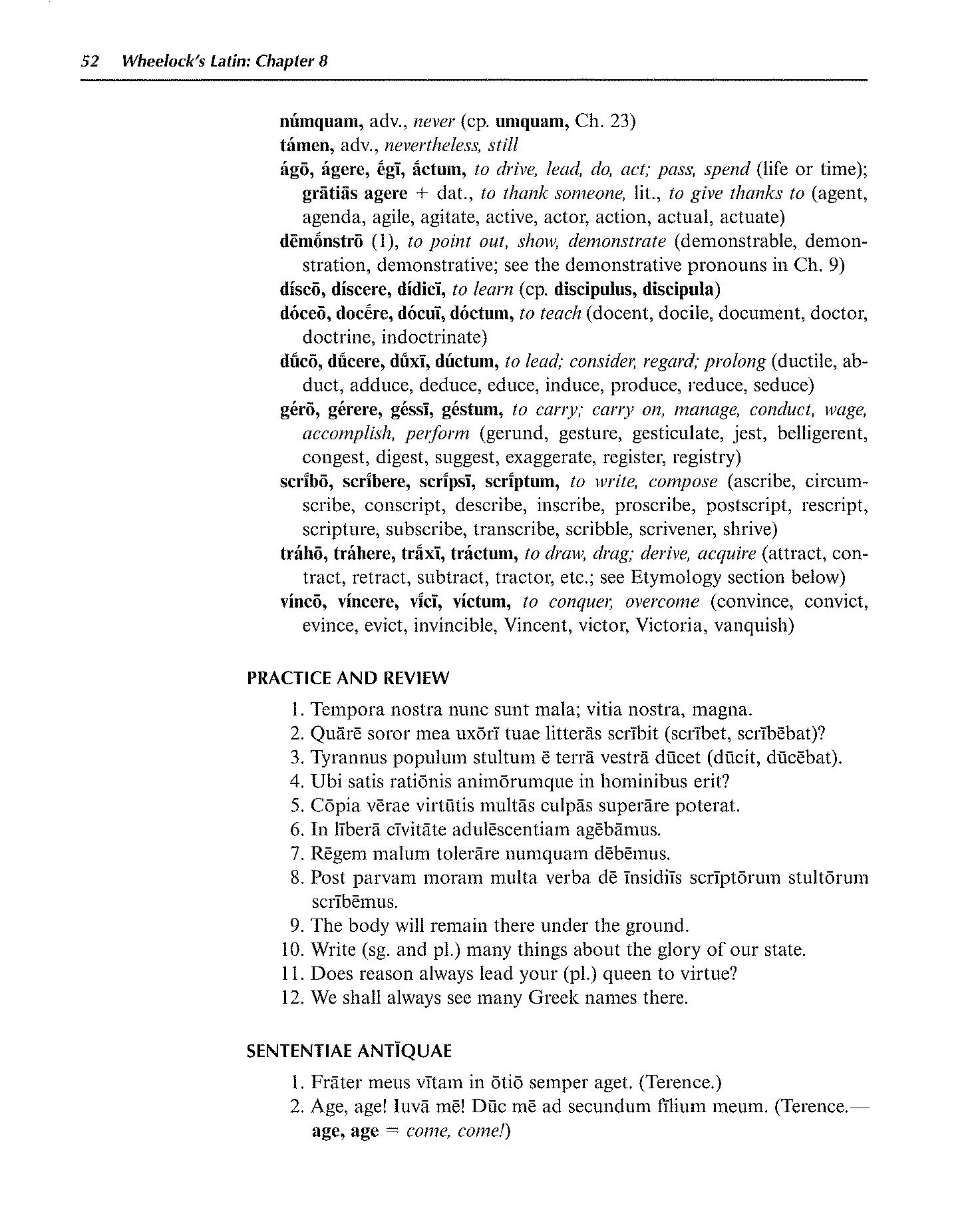
page_listing.tpl
page_subListingDetails.tpl
sub_listingDetails_style1.tpl
sub_listingDetails.title.tpl
dīscere to learn
dīscere is a Latin Verb that primarily means to learn.
Definitions for dīscere
Wheelock's Latin
Verb
- 1
to learn
Oxford Latin Dictionary
Verb
- 1
To acquire knowledge of or skill in, learn.
- 2
To learn to recognize, get to know.
- 3
To hear, ascertain, be informed of.
Sentences with dīscere
Latin to English
Animī plūrimōrum hominum tam stultī sunt ut discere nōn cupiant.Compare The souls of very many men are so foolish that they do not wish to learn.
Quidam magistrī discipulōs tantā cum arte docēbant ut ipsī discipulī quidem discere cuperent.Compare Some teachers used to teach their pupils so skillfully (with such great skill) that even the pupils themselves wanted to learn.
Sī meliōribus librīs ūsī essent, plūra didicissent.Compare If they had used better books, they would have learned more.
Librōs legimus ut multa discāmus.Compare We read books (in order) to learn many things.
At multae mentēs ita ācrēs sunt ut bene discere possint. Compare But many minds are so keen that they can learn well.
Ius civilis disco.Compare He learnt civil law.
Multus oportet disco atque dedisco.Compare It behoves him to learn and unlearn many things.
Conjugation table for dīscere
Cactus2000
| ACTIVE | |
| Indicative present | Indicative imperfect |
| dīscō dīscis dīscit dīscimus dīscitis dīscunt | dīscēbam dīscēbās dīscēbat dīscēbāmus dīscēbātis dīscēbant |
| Indicative perfect | Indicative pluperfect |
| didicī didicistī didicit didicimus didicistis didicērunt / didicēre | didiceram didicerās didicerat didicerāmus didicerātis didicerant |
| Indicative future | Indicative future perfect |
| dīscam dīscēs dīscet dīscēmus dīscētis dīscent | didicerō didiceris didicerit didicerimus didiceritis didicerint |
| Subjunctive present | Subjunctive imperfect |
| dīscam dīscās dīscat dīscāmus dīscātis dīscant | dīscerem dīscerēs dīsceret dīscerēmus dīscerētis dīscerent |
| Subjunctive perfect | Subjunctive pluperfect |
| didicerim didiceris didicerit didicerimus didiceritis didicerint | didicissem didicissēs didicisset didicissēmus didicissētis didicissent |
Infinitive present dīscere Infinitive perfect didicisse Infinitive future - | Imperative present dīsce dīscite Imperative future dīscitō dīscitō dīscitōte dīscuntō |
| PASSIVE | |
| Indicative present | Indicative imperfect |
| dīscor dīsceris dīscitur dīscimur dīsciminī dīscuntur | dīscēbar dīscēbāris / dīscēbāre dīscēbātur dīscēbāmur dīscēbāminī dīscēbantur |
| Indicative perfect | Indicative pluperfect |
| - - - - - - | - - - - - - |
| Indicative future | Indicative future perfect |
| dīscar dīscēris / dīscēre dīscētur dīscēmur dīscēminī dīscentur | - - - - - - |
| Subjunctive present | Subjunctive imperfect |
| dīscar dīscāris / dīscāre dīscātur dīscāmur dīscāminī dīscantur | dīscerer dīscerēris / dīscerēre dīscerētur dīscerēmur dīscerēminī dīscerentur |
| Subjunctive perfect | Subjunctive pluperfect |
| - - - - - - | - - - - - - |
Infinitive present dīscī Infinitive perfect - Infinitive future - | Imperative present dīscere dīsciminī Imperative future dīscitor dīscitor - dīscuntor |
| PARTICIPLE | ||
| Participle present active | ||
| Nom. | dīscēns | dīscentēs |
| Gen. | dīscentis | dīscentium |
| Dat. | dīscentī | dīscentibus |
| Acc. | dīscentem | dīscentēs |
| Abl. | dīscente | dīscentibus |
| Participle future active | ||
| Nom. | - | - |
| Gen. | - | - |
| Dat. | - | - |
| Acc. | - | - |
| Abl. | - | - |
| Participle perfect passive | ||
| Nom. | - | - |
| Gen. | - | - |
| Dat. | - | - |
| Acc. | - | - |
| Abl. | - | - |
| Gerundive | ||
| Nom. | dīscendus | dīscendī |
| Gen. | dīscendī | dīscendōrum |
| Dat. | dīscendō | dīscendīs |
| Acc. | dīscendum | dīscendōs |
| Abl. | dīscendō | dīscendīs |
| Gerund | Supine | |
| Nom. | dīscere | - |
| Gen. | dīscendī | - |
| Dat. | dīscendō | |
| Acc. | dīscendum | |
| Abl. | dīscendō | |
Data sources
Notes
- Definitions
- Frederick M. Wheelock, Wheelock's Latin, 6th ed., rev. Richard A. LaFleur (New York, NY: HarperCollins Publishers, 2005): 52.
- P. G. W. Glare, Oxford Latin Dictionary, Vols. 1-8 (Oxford: Clarendon Press, 1982): 550.
- Word frequencies
- Christopher Francese, "Latin Core Vocabulary," Dickinson College Commentaries, last modified 2014, http://dcc.dickinson.edu.
- Paul B. Diederich, The Frequency of Latin Words and Their Endings, PhD diss., (Columbia University, 1939).
- Louis Delatte, Suzanne Govaerts, Joseph Denooz, and Etienne Evrard, Dictionnaire fréquentiel et index inverse de la langue latine [Frequency Dictionary and Inverse Index of the Latin Language] (Liège, Belgium: Laboratoire d'analyse statistique des langues anciennes de l'Université de Liège [L.A.S.L.A.], 1981): 122.
Bibliography
Allen, Joseph H. Allen and Greenough's New Latin Grammar for Schools and Colleges: Founded on Comparative Grammar. Edited by James B. Greenough, George L. Kittredge, Albert A. Howard, and Benjamin L. D'Ooge. Boston, MA: Ginn & Company, 1903.
Crystal, David. A Dictionary of Linguistics and Phonetics. 6th ed. Oxford, UK: Blackwell Publishing, 2008.
Delatte, Louis, Suzanne Govaerts, Joseph Denooz, and Etienne Evrard. Dictionnaire fréquentiel et index inverse de la langue latine [Frequency Dictionary and Inverse Index of the Latin Language]. Liège, Belgium: Laboratoire d'analyse statistique des langues anciennes de l'Université de Liège (L.A.S.L.A.), 1981.
Diederich, Paul B. The Frequency of Latin Words and Their Endings. PhD diss., Columbia University, 1939.
Francese, Christopher. "Latin Core Vocabulary." Dickinson College Commentaries. Last modified 2014. http://dcc.dickinson.edu/latin-vocabulary-list.
Gildersleeve, Basil L., and Gonzales Lodge. Gildersleeve's Latin Grammar: Third Edition, Revised, and Enlarged. 3rd ed. London, England: Macmillan and Co., 1903.
Glare, Peter G.W. Oxford Latin Dictionary. Vols. 1-8. Oxford, England: Clarendon Press, 1982.
Krüger, Bernd. "Latin Conjugation Tables." Cactus2000. Accessed May 5, 2023. https://latin.cactus2000.de/index.en.php.
Pierson, Nick. "Sound of Text." Accessed October 26, 2019. https://soundoftext.com.
Wheelock, Frederick M. Wheelock's Latin. 6th ed. Revised by Richard A. LaFleur. New York, NY: HarperCollins Publishers, 2005.
Wiktionary Contributors. "Victionarium." Wikimedia Foundation, Inc. Updated March 18, 2019. https://la.wiktionary.org/wiki/Victionarium:Pagina_prima.
Citation
Chicago (17th ed.)
Allo Contributors. "dīscō, dīscere, didicī, - (v.) - Latin Word Definition." Allo Latin Dictionary. Last modified . Accessed February 19, 2026. http://ancientlanguages.org/latin/dictionary/disco-discere-didici.
Entry created on . Last updated on .








